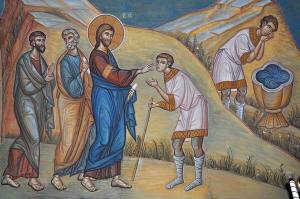Sunday of the Man Born Blind – Metropolitan of Strumica Nahum
Refer: John 9, 1-38
Two meetings took place between the man born blind and Christ: the first one while he was still blind; and the second one, after he received sight and after he justified Christ before the Pharisees. The Pharisees also met the (blind) man twice: the first time, when they did not believe that he was blind; and the second time, when they wanted to disparage the work of Christ, and Christ Himself. And while the Pharisees fell from one sin to another sin, because they sinned first against the man, and then against the Lord Himself; during that time the blind man advanced from strength to strength; first he received sight, then he was enlightened.
This gospel reading is just another school example, from the many in the New Testament, it describes the conflict between those who hold to the word of the Law – that kills, and those who value the Spirit of the Law – Who makes alive; It describes the conflict between those ,who in everything that does not correspond to their self-love, oppose with empty words, and those who oppose empty words with deeds; It describes a conflict between those who use personal disqualifications, and those who are persons; Between those who hide behind the authority of the institution, and those who are carriers of charisma – of the gift of the Holy Spirit.
Observe how empty words and personal disqualifications are powerless before the good deeds: “Give glory to God! We know that this Man is a sinner. ” And he answered and said: “Whether He is a sinner or not I do not know. One thing I know: that I was blind, and now I see.” And, how can they respond to the verified and confirmed fact that the man was blind and now he sees? By which human wisdom and pretence would they oppose this fact, known to all? With what words would they oppose any good deed done in the name of God, let alone done by God personally?
The Pharisees are trying to find out the recipe for success, as if it was some secret knowledge that can be easily attained with reason (intellect, nous) and learned as if it was some impersonal magical power, as if it was something that you can buy or sell: ” What did He do to you? How did He open your eyes? ” If I did not know that the Lord, through the man that was born blind, with best intention is reminding them about the growth in the personal relationship with Him as a path to that power, I would have thought that the man was joking with them:“ I have told you already and you did not listen. Why do you want to hear it again? Do you also want to become His disciples? ”
But is this followed by the repentance of the Pharisees or is there yet one more failure?
Here is how people without authority hide behind the authority of the institution they represent, with which they obviously have nothing to do: “You are His disciple, but we are Moses’ disciples. We know that God spoke to Moses; as for this Man we do not know where He is from.”
If I did not know that the Lord, through the man that was born blind, with the best intention is reminding them of the spiritual law of obedience, again I would have thought that the man is joking with them: “This is marvellous thing, that you do not know where He is from, yet He has opened my eyes! Now we know that God does not hear sinners: but if anyone is worshiper of God and does His will, He hears him. Since the world began it has been unheard of that anyone opened the eyes of one who was born blind. If this Man was not from God, He could do nothing.”
But even after this, is there repentance of the Pharisees or there is yet another sin of anger and unbelief? Judge for yourselves: “You were completely born in sins, and are you teaching us?” And, as the Gospel states in the following passage: “They cast him out.” How much this Gospel reading reminds us of the case of our Church and of some of the people who run the church administratively that does not want us to be recognized.
But when the Pharisees reject you because of the bearing witness of Christ, do not be afraid, but rejoice: It is only a confirmation that Christ Himself has found you and accepted you, and that Christ Himself leads you and brings you into all Truth. “Jesus heard that they had cast him out, and when He had found him, He said to him, ‘Do you believe in the Son of God?’ He answered and said: ‘Who is He, Lord, that I may believe in Him? ‘ And Jesus said to him: ‘You have both seen Him and it is He who is talking with you.’ Then he said, ‘Lord, I believe!’ And he worshiped Him.”
Most-Holy Theotokos, save us!
Metropolitan of Strumica Nahum
(05.06.2021 15:55)

